新目标英语八年级下_Unit_7_Reading 新用
新目标八下英语Unit7朗读+微课精讲+知识点习题

单词表Unit 7 单词(音标)square [skweə(r)] n. 平方,正方形,广场meter [ˈmi:tə] n. 米deep [di:p] adj. 深的desert [ˈdezət] n. 沙漠population [ˌpɔpjuˈleiʃən] n. 人口(数量),全体居民Asia [ˈeɪʒə] n. 亚洲feel free (可以)随便(做某事)tour [tuə] n. 旅行,观光wall [wɔ:l] n. 墙amazing [əˈmeɪzɪŋ] adj. 令人惊异的ancient [ˈeɪnʃənt] adj. 古代的,古老的protect [prəˈtekt] v. 保护wide [waɪd] adj. 宽的,广阔的as far as I know 就我所知achieve [əˈtʃi:v] v. 完成,实现achievement [əˈtʃi:vmənt] n. 成就,成绩southwestern [saʊθ westən] adj. 西南的,西南方向的thick [θɪk] adj. 厚的,浓的include [ɪnˈklu:d] v. 包括,包含freezing [ˈfri:zɪŋ] adj. 极冷的,冷冻的condition [kənˈdɪʃn] n. 条件,状况take in 吸入,吞入succeed [səkˈsi:d] v. 成功,实现目标,完成challenge [ˈtʃælɪndʒɪŋ] n. & v. 挑战,考验in the face of 面对(问题,困难)force [fɔ:s] n. 力,力量nature [ neɪtʃə(r)] n. 自然界,大自然even though(=even if)即使,虽然ocean [ əʊʃn] n. 海洋the Pacific Ocean 太平洋cm(centimeter) [ˈsentɪˌmi:tə] n. 厘米weigh [wei] v. 称…重量birth [bɜ:θ] n. 出生,诞生at birth 出生时up to 到达(某数量,程度),不多于adult [ əˈdʌlt] n. 成年人bamboo [bæmˈbu:] n. 竹子endangered [ɪnˈdeɪndʒəd] adj. 有危险的,濒临灭绝的,濒危的research [rɪˈsɜ:tʃ] n. & v. 研究,调查keeper [ˈki:pə(r)] n. 饲养员,保管人awake [əˈweɪk] adj. 醒着excitement [ɪkˈsaɪtmənt] n. 激动,兴奋walk into 走路时撞到fall over 绊倒illness [ˈɪlnəs] n. 疾病,生病remaining [rɪˈmeɪnɪŋ] adj. 遗留的,剩余的or so 大约artwork [ˈɑ:twə:k] n. 艺术品,插图,图片wild [waɪld] adj. 野性的,野生的government [ˈgʌvənmənt] n. 政府whale [weɪl] n. 鲸protection [prəˈtekʃn] n. 保护,保卫huge [hju:dʒ] adj. 巨大的,极多的dynasty [ˈdɪnəstɪ] n. 朝代,王朝base [beɪs] n. 基础,基地知识点汇总第7单元知识点汇总(供课前预习课后复习)Unit 7 What\\\\\'s the highest mountain in the world?【重点单词】square [skweə(r)] n. 平方,正方形,广场meter [ˈmi:tə] n. 米deep [di:p] adj. 深的desert [ˈdezət] n. 沙漠population [ˌpɔpjuˈleiʃən] n. 人口(数量),全体居民Asia [ˈeɪʒə] n. 亚洲feel free (可以)随便(做某事)tour [tuə] n. 旅行,观光wall [wɔ:l] n. 墙amazing [əˈmeɪzɪŋ] adj. 令人惊异的ancient [ˈeɪnʃənt] adj. 古代的,古老的protect [prəˈtekt] v. 保护wide [waɪd] adj. 宽的,广阔的as far as I know 就我所知achieve [əˈtʃi:v] v. 完成,实现achievement [əˈtʃi:vmənt] n. 成就,成绩southwestern [saʊθ westən] adj. 西南的,西南方向的thick [θɪk] adj. 厚的,浓的include [ɪnˈklu:d] v. 包括,包含freezing [ˈfri:zɪŋ] adj. 极冷的,冷冻的condition [kənˈdɪʃn] n. 条件,状况take in 吸入,吞入succeed [səkˈsi:d] v. 成功,实现目标,完成challenge [ˈtʃælɪndʒɪŋ] n. & v. 挑战,考验in the face of 面对(问题,困难)force [fɔ:s] n. 力,力量nature [ neɪtʃə(r)] n. 自然界,大自然even though(=even if)即使,虽然ocean [ əʊʃn] n. 海洋the Pacific Ocean 太平洋cm(centimeter) [ˈsentɪˌmi:tə] n. 厘米weigh [wei] v. 称…重量birth [bɜ:θ] n. 出生,诞生at birth 出生时up to 到达(某数量,程度),不多于adult [ əˈdʌlt] n. 成年人bamboo [bæmˈbu:] n. 竹子endangered [ɪnˈdeɪndʒəd] adj. 有危险的,濒临灭绝的,濒危的research [rɪˈsɜ:tʃ] n. & v. 研究,调查keeper [ˈki:pə(r)] n. 饲养员,保管人awake [əˈweɪk] adj. 醒着excitement [ɪkˈsaɪtmənt] n. 激动,兴奋walk into 走路时撞到fall over 绊倒illness [ˈɪlnəs] n. 疾病,生病remaining [rɪˈmeɪnɪŋ] adj. 遗留的,剩余的or so 大约artwork [ˈɑ:twə:k] n. 艺术品,插图,图片wild [waɪld] adj. 野性的,野生的government [ˈgʌvənmənt] n. 政府whale [weɪl] n. 鲸protection [prəˈtekʃn] n. 保护,保卫huge [hju:dʒ] adj. 巨大的,极多的dynasty [ˈdɪnəstɪ] n. 朝代,王朝base [beɪs] n. 基础,基地【重点短语】1. as big as 与……一样大2. one of the oldest countries 最古老的国家之一3. feel free to do sth. 随意地做某事4. as far as I know 据我所知5. man-made objects 人造物体6. part of... ...... 的组成部分7. the highest mountain 最高的山脉8. in the world 在世界上9. any other mountain 其它任何一座山10. of all the salt lakes 在所有的咸水湖中11. run along 跨越……12. freezing weather 冰冻的天气13. take in air 呼吸空气14. the first people to do sth. 第一个做某事的人15. in the face of difficulties 面临危险16. give up doing sth. 放弃做某事17. ac hieve one’ s dream 实现某人的梦想18. the forces of nature 自然界的力量19. reach the top 到达顶峰20. even though 虽然;尽管21. at birth 在出生的时候22. be awake 醒着23. run over with excitement 兴奋地跑过去24. walk into sb. 撞到某人25. fall over 摔倒26. take care of 照顾;照料27. every two years 每两年28. cut down the forests 砍伐林木29. endangered animals 濒危动物30. fewer and fewer pandas 大熊猫越来越少31. be in danger 处于危险之中32. the importance of saving these animals 拯救这些动物的重要性【重点句型】1.It is also very hard to take in air as you get near the top. 当你接近山顶时,连呼吸都会困难。
八年级下册英语人教版Unit7教案

新目标英语八年级(下)Unit7 Would you mind turning down the music?教学设计一、教学内容及分析本单元是八年级英语下册的第七单元(Unit 7 Would you mind turning down the music?),主题是如何更礼貌的提建议,主要功能项目是“Make requests”和“Apologize”,本单元的语法要点是“Would you mind …?”和“Could you please…”等句型的运用,知识重难点为:“would you mind +动名词”和“Could you please +动词原形”等句型的正确运用,以及能够正确运用其否定形式。
整个单元教材内容如下:Section A是语言的基本输入和呈现部分,是本单元的语言基本内容。
1a、1b、1c分别是看、听、说的任务环节,均围绕1a的卡通画而展开。
可先创设情景引入,呈现Would you mind +动名词向别人提出请求的语言功能项目。
再呈现Would you mind not+动名词,让学生充分利用1a的卡通画内容来练习。
2a、2b是任务型听力,学生独立完成。
2a 是排序,2b是配对。
2a是通过听力,展示Would you mind …?和Would you mind not…?在交际中的运用,2b是呈现如何向别人道歉。
2c要求以2a、2b的听力材料来进行交际练习,体会向别人提出请求和向别人道歉的语言功能项目。
在3a的教学中,要求学生看图,补全图片中的“请求”,3b的结对对话,要求学生用Would you, Could you, have to编对话,至于第4部分的groupwork,先可让学生制定“工作任务”,再进行对话。
Section B是综合的语言运用和知识的扩展部分。
1a、2a、2b都围绕的卡通画展开,2c是2a、2b听力材料的操练对话,3a和3b是阅读和写作的训练,通过完成3a、3b的任务,加深学生对“提出请求,表达歉意”的理解和运用。
新目标英语八年级下册Unit7说课稿
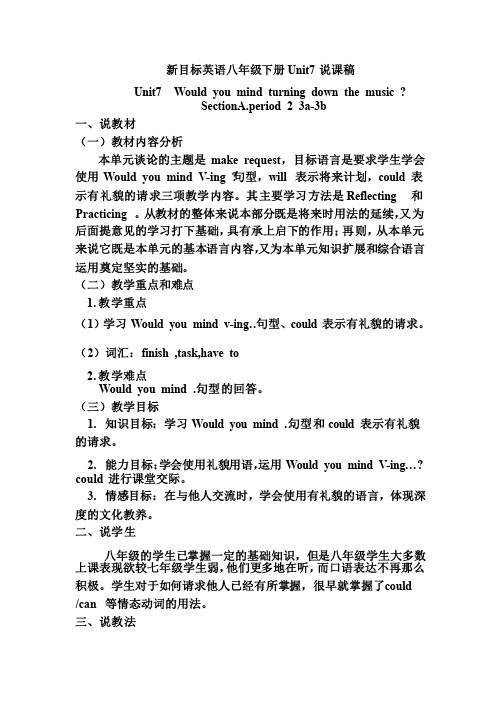
新目标英语八年级下册Unit7说课稿Unit7 Would you mind turning down the music ? SectionA.period 2 3a-3b 一、说教材(一)教材内容分析本单元谈论的主题是make request,目标语言是要求学生学会使用Would you mind V-ing ?句型,will表示将来计划,could表示有礼貌的请求三项教学内容。
其主要学习方法是Reflecting和Practicing。
从教材的整体来说本部分既是将来时用法的延续,又为后面提意见的学习打下基础,具有承上启下的作用;再则,从本单元来说它既是本单元的基本语言内容,又为本单元知识扩展和综合语言运用奠定坚实的基础。
(二)教学重点和难点1.教学重点(1)学习Would you mind v-ing …句型、could 表示有礼貌的请求。
(2)词汇:finish ,task,have to 2.教学难点Would you mind …句型的回答。
(三)教学目标1. 知识目标:学习Would you mind …句型和could 表示有礼貌的请求。
2. 能力目标:学会使用礼貌用语,运用Would you mind V-ing …? could进行课堂交际。
3. 情感目标:在与他人交流时,学会使用有礼貌的语言,体现深度的文化教养。
二、说学生 八年级的学生已掌握一定的基础知识,但是八年级学生大多数上课表现欲较七年级学生弱,他们更多地在听,而口语表达不再那么积极。
学生对于如何请求他人已经有所掌握,很早就掌握了could /can 等情态动词的用法。
三、说教法1)本课主要采用直观演示法和练习法进行教学。
2)创设问题情境,借以充分调动学生求知欲,激发学生的探究心理。
的原则,在学生以小组3)坚持“以学生为主体,以教师为主导”)坚持“以学生为主体,以教师为主导”的原则,在学生以小组运用情景交际法,让让运用情景交际法,在老师启发引导下,运用情景交际法,为单位讨论基础上,在老师启发引导下,学生自主编排对话进行练习,充分体现出学生的主体性。
新目标英语八年级下册unit7 what'sthehighestmountainintheword?(setionB)同步练习

新目标英语八年级下册unit7what's the highest mountain in the word?(setionB)一、根据句意及汉语或首字母提示完成单词1、根据句意及汉语或首字母提示完成单词(1)Pandas like eating b________.(2)The scientists are doing some r________ about pandas.(3)Our ________(政府)works for the people.(4)The baby w________ 5 kilos.(5)There are four ________(海洋) in the world.二、用所给词的适当形式填空2、用所给词的适当形式填空(1)Do you lie ________ (wake) at night, worrying about things?(2)Do you know the ________ (important) of saving the wild animals?(3)We should make some rules on whale ________ (protect).(4)He can't go to school because of his ________ (ill).(5)When the lost child saw his mother, he ran over with ________ (excite).三、单选题3、Pandas are very special _____________ us.A、inB、toC、ofD、at4、What is the way of _____________ animals?A、saveB、savedC、savingD、saves5、Mrs Green missed her footing and _____________ just now.A、fell overB、fell illC、fell forD、fell into6、There is a boy _____________ in the river.A、swimB、swimmingC、to swimD、swam7、An elephant eats _____________ than a panda.A、many time moreB、many times muchC、many times moreD、much time more8、It has stopped _____________.A、rainB、to rainC、to rainingD、raining9、Thanks for your invitation, but I'm so sorry I can't go. I need to _________ my baby at home.A、take awayB、take offC、take care ofD、take out of10、I spent 5 $ _____________ this book.A、inB、to buyC、buyingD、buy11、Do you think there _____________ robots in people's homes in the future?A、will beB、will isC、be will12、We wear sunglasses to protect our eyes _____________ the sun.A、ofB、atC、forD、from13、The Olympic Games are held (举行) _____________.A、every four yearB、each four yearC、each four yearsD、every four years14、There are many _____________ in Sichuan.A、bamboo treeB、bamboo treesC、bamboos treeD、bamboos trees15、—It's so cold today.—Yes, it's _____________ colder than it was yesterday.A、someB、moreC、veryD、much16、If farmers _____________ trees and forests, giant pandas _____________ nowhere to live.A、cut down, haveB、will cut down, will haveC、will cut down; haveD、cut down, will have17、There are eight keepers at the Chengdu Research Base. Two are young, and ____________ keepers are old.A、the othersB、the otherC、otherD、another18、These yellow dresses are very nice. I hope to have _____________.A、littleB、fewC、oneD、it19、The world's population is growing ___________ and there is ___________ land and water for growing rice.A、more; lessB、larger, fewerC、larger, lessD、more, fewer20、________ exercise you take, _____________you'll be.A、The fewer, the fatterB、The less, the fatterC、The less, the more fatter21、Funtawild Adventure is very popular and _____________ tourists visit it year by year.A、more and moreB、fewer and fewerC、less and lessD、more or less22、Today it's normal for married women to go out to work, but it was _____________ in the past.A、commonB、more commonC、less commonD、the most common四、用方框内的词填空23、用方框内的词填空(1)The ________ panda is black and white.(2)Some ________ animals are endangered.(3)The whales are ________.(4)The Pacific ________ is the largest of four.(5)Few of the old buildings ________.五、根据要求完成句子24、根据要求完成句子(1)His mother is ill. He has to take care of his mother. (改为同义句)His mother is ill. He has to ________ ________ his mother.(2)He spent 2 hours playing computer games last night. (改为同义句)It ________ him 2 hours ________ ________ computer games last night.(3)John didn't go to school because he was ill.(合并成一句)John didn't go to school ________ ________ his ________.(4)The panda weighs 100 kilos.(对画线部分提问)________ ________ does the panda weigh?(5)The elephant weighs l, 000 kilos. The monkey weighs 57 kilos.(合并成一句)The elephant weighs ________ ________ ________ than the monkey.六、根据汉语完成句子25、根据汉语完成句子(1)在将来,有更多机器人在家里工作。
2020年春人教新目标英语八年级下册unit7知识点分析与练习(无答案)

2020年春人教新目标英语八年级下册Unit7 what’s the highest mountain in the world ? 知识点一、重点短语:1. run through 穿过2. run into 流入3. in the world 在世界上4. in the end (=finally ) 最后5. lie in ( locate in ) 位于6. …meters high( long , wide) …米高(长,宽)7. fell free to do sth 做某事无需拘束8. as far as I know 据我所知9. the Ming Dynasty 明朝10. the ancient emperors 古代帝王11. the great wall 长城12. freezing 冻冰的;结冰的13. take in 吸入;吞入(体内)14. in the face of 面对(问题、困难等)15. as … as …与…一样16. at birth 出生时;刚出生17. fall over 向前摔倒、跌倒18. play with sb ( play with sth)和某人一起玩(玩某物)19. cut down 砍倒;裁短20. the pacific ocean 太平洋讲一讲1形容词与副词的比较级与最高级(section A)形容词、副词比较级和最高级规则变化和不规则变化。
能修饰比较级的词(表程度)Much a bit a little even如:it’s much colder today than it was yesterday . 今天比昨天冷得多。
练一练1比较级与最高级专题练习1. My brother is ___ more outgoing than me.A. manyB. littleC. much2. October 12th was one of ______ days in 2005. Shenzhou-VI was launched (发射)successfully.A. excitingB. more excitingC. the most exciting3. Which city is ______, Beijing, Shanghai or Fuzhou?A. beautifulB. more beautifulC. the most beautiful4. _____ children there are in a family, ____ their life will be.A. The less, the betterB. Fewer, richerC. The fewer, the better5. Mobile phones are very popular now and they are ______ than before.A. cheapB. cheaperC. the cheapest6. In our city, it’s _____ in July, but it’s even ___ in August.A. hotter, hottestB. hot, hotC. hot, hotter7. Of the two skirts, the pink one is ______.A. the nicestB. the nicerC. nicer8. Ja ck’s handwriting is as ____ as Mike’s.A. goodB. betterC. best9. We can do the work better with ____ money and ______ people.A. little, fewB. less, fewerC. fewer, less10. Jim is the tallest student in our class and Tom is the second ______ one.A. tallB. tallerC. tallest11. 在下列横线填上合适的词。
2020年春人教新目标英语八年级下册Unit7知识点归纳总结
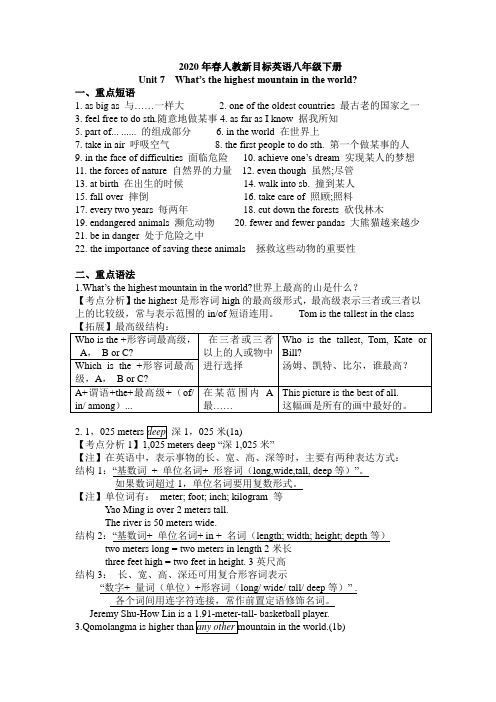
2020年春人教新目标英语八年级下册Unit 7 What’s the highest mountain in the world?一、重点短语1. as big as 与……一样大2. one of the oldest countries 最古老的国家之一3. feel free to do sth.随意地做某事4. as far as I know 据我所知5. part of... ...... 的组成部分6. in the world 在世界上7. take in air 呼吸空气 8. the first people to do sth. 第一个做某事的人9. in the face of difficulties 面临危险 10. achieve one’s dream 实现某人的梦想11. the forces of nature 自然界的力量 12. even though 虽然;尽管13. at birth 在出生的时候 14. walk into sb. 撞到某人15. fall over 摔倒 16. take care of 照顾;照料17. every two years 每两年 18. cut down the forests 砍伐林木19. endangered animals 濒危动物 20. fewer and fewer pandas 大熊猫越来越少21. be in danger 处于危险之中22. the importance of saving these animals 拯救这些动物的重要性二、重点语法1.What’s the highest mountain in the world?世界上最高的山是什么?【考点分析】the highest 是形容词high 的最高级形式,最高级表示三者或三者以上的比较级,常与表示范围的in/of 短语连用。
Tom is the tallest in the class2. 1,深1,025米(1a)【考点分析1】深1,025米”【注】在英语中,表示事物的长、宽、高、深等时,主要有两种表达方式:结构1:“基数词 + 单位名词+ 形容词(long,wide,tall, deep 等)”。
新目标八下Unit7what_is_the_highest_mountain_in_the_world

3b
Read the article again and complete the chart.
Paragraph 1 Paragraph 2 List tour dangers for climbers. List three achievements
Paragraph 3 List tour comparisons
8. challenge v. & n. 挑战;考验 e.g. The job doesn’t really challenge him. 这项工作不能真正的考验他。 The new government’s first challenge is the economy. 新政府面临的第一个挑战是经济问题。 9. in the face of 面对(困难、问题等) e.g. In the face of difficulties, he’s completely
According to the passage, fill in the blanks. One of the most ___________ dangerous sports in the world is mountain _________, climbing and one of the most popular _________ places to go for this is the Himalayas. These risk extremely high _______ attract _________ from all over the world. climbers Many people say this is one of the most ________ parts of the world. famous
2022-2023学年八年级英语新目标Unit 7习题课件

A: (2)__D_____ It will make driving difficult.
B: Yes. And the temperature may drop (温度可能降低) later in the week.
A: (3)__B_____ B: Yes, it probably will. We will
have to wear warm clothes in such cold weather. A: Yes. (4)__G_____
B: So we should stay at home and avoid ( 避免) staying outside too long.
When Sue and her mom (9)__g_o_t___(get) back to their own apartment, they saw a big bag near the door. The note (便条) on the bag read:
We have too many tomatoes. We (10)_t_h_o_u_g_h_t_/_t_h_i_n_k_ (think) you could use some.
As they went down the stairs, Sue (7)__s_a_w___ (see) Mr. Brown. “Hi, Mr. Brown,” said Sue. “Could you use some tomatoes?”
“Of course. I'm on my way to help out at the soup kitchen. I (8)_w__il_l _b_e_(be) happy to take all you have for today's lunch.”
初中英语_人教版八年级下Unit7 Reading教学设计学情分析教材分析课后反思

Unit7 Would you mind keepingyour voice down?……………………………………………………………………………………一.教师寄语:If everyone helps a bit, we’ll live in a better life!二.目标呈现:(一).知识目标:1.词汇:term, etiquette, behavior, voice, public, litter,cigarette,normal, Asian, impolite, careful, allow, cough, sneeze,break, smoke, criticize, drop, pick,behave,politely,comfortable.2.短语:at first, keep…down, take care, break the rule,put out,pick…up3.句型:Would you mind doing this or would you mind not doingthat?...(二).能力目标:培养学生的交际能力,树立社会公德意识。
(三).情感目标:使学生体验交际中的委婉语气的使用,从而把自己培养成为一个有礼貌、有道德的中学生。
三.学习过程【Step1】. Warming upWhat have you seen in the video?【Step2】. Leading in1.What are they doing in the pictures?Picture1 Picture2Picture3 Picture42. What are they doing in the picture?1. 2.3. 4.5.【Step3】Fast readingWhat is the passage about?【Step4】Intensive reading1. Para.1 What does “etiquette” mean?2. Para.2 Is the etiquette the same in every culture or in every situation?Give some examples.3.Paras.3&4 If we see someone breaking the rules of etiquette,we may politelygive them some suggestions.4. Read the whole passage.Match the paragraphs with the best summaries.Para1: Para2: Para3: Para4:A.The way people behave is different in different culturesand situations.B. Sometimes, rules of etiquette are the same almost everywhere.C. Etiquette is very important idea to understand.D. We might want to ask someone to behave more politely ifwe see them breaking a rule of etiquette.5. Reading strategy: topic sentences.【Step5】Conclusion What we have learnt today?【Step6】能力提升1.At school ,we have seen some impolite behavior . Make a list.2.Solutions. You can make proposals (倡议书) or some signs.【Step7】Homework Surf the internet andfind out the rulers of etiquette that aredifferent in foreign countries and sharewith your partner.教学反思本节课是一节阅读课,标题是“Would you mind keeping your voice down?”我从三个方面进行了课后反思。
2019中考英语人教版(新目标)教材梳理:八年级下册 Unit7 知识点+练习(含答案)

Unit 7 What’s the highest mountain in the world?重点1.掌握形容词和副词比较级最高级的变化规则;2.常用句型的学习,如as....as; 比较级+than等;难点1.(not)as...as2.one of + the + 形容词的最高级+ 复数名词3.It is + adj. + to do sth易错点1.形容词比较级最高级的不规则变化;2.The+比....,the+比...句型;3.比and比句型高频考点1.形容词比较级最高级变形;2.其相关的句型的灵活运用;词汇:square n. 正方形;平方meter n.米;公尺deep adj. 深的desert n. 沙漠population n. 人口;Asia n. 亚洲wall n. 墙tour v. 旅行;旅游tourist n. 游客ancient adj. 古代的;古老的protect v. 保护;防护wide adj. 宽的;宽阔的paragraph n. 段落thick adj. 厚的;浓的include v. 包括;包含condition n. 条件;状况take in 吸入;吞入succeed n. 成功Japan n. 日本in the face of 面对achieve v. 实现;到达force n. 力量nature n. 自然ocean n. 大海;海洋weigh adj. 有...重;重at birth 出生时bamboo n. 竹子research v. 调查;研究awake adj. 醒着的;excitement n. 激动;兴奋illness n. 疾病adult n. 成年人remain v. 遗留;剩余government n. 政府huge adj. 巨大的oil n. 油;食用油第一部分:词汇精讲1.achieve v. 达到;完成;成功e.g. He will never achieve anything if he doesn’t work harder.如果他不加紧努力工作,他会一事无成。
新目标英语八年级下第7单元知识点讲解及练习

Unit7What’sthehighestmountainintheworld?TeachingAims:○1掌握本元要点及能用比和最高各之最。
○2能听懂和相关地理和自然的。
Keypoints:Phrases:insize,intheworld,2meterstall/long/wide,thebiggestpopulation,oneofthebig gest,themostpopularquestion,talkabout,theancientemperors,themainreason,asfarasIknow,noman-madeobjects,mountainclimbing,thesouthwesternpartofChina,thickclouds,coverthetop,riskone’s life,challengeoneself,achieveone,theforest ofnature,’sdream trytodosth.,thespiritoftheclimbers,manytimesmorethan,liveupto,pr eparebeawake,bespecialtosb.,spendsometime doingsth.,intheremaining forest,endangeredanimals,inthefuture⋯Sentences:What’theshighestmountainintheworld?Qomolangma.HowlongisQomolangma?It’smetershigh.It’shigherthananyothermountain.Whichisthedeepestsaltlakeintheworld?TheCaspianSeaisthedeepestofallthesaltlake.DidyouknowthatChinaisoneoftheoldestcountriesintheworld?Yes,Idid.It’smucholderthantheUS.Difficultpoints:形容和副的比和最高化和用法。
新目标(人教)八年级下册英语单元复习课件 unit 7 复习课件
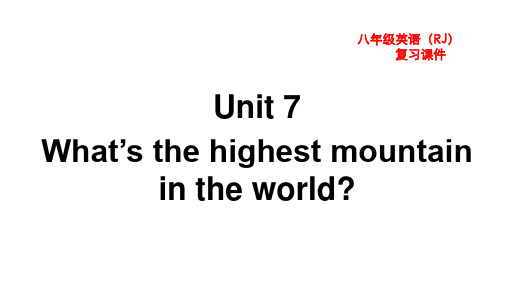
a symbol of
三、核心句型
1.珠穆朗玛峰比世界上其他任何山脉都要高。
Qomolangma is h__ig_h__e_r_ _th__a_n_ _a_n_y__ _o_t_h_e_r_ m__o_u__n_t_a_in_ in the world. 2.世界上最高的山是什么? What is ____ ________ mountain____ _____ _______?
这张桌子比那张桌子长三倍。 【拓展延伸】 “倍数+as+形容词+as”表示“……是……的几倍”。 e.g.This table is three times as long as that one.
这张桌子是那张桌子的三倍长。
When the babies see the keepers,they run over to them with excitement and some of the young pandas even walk into their friends and fall over! 当大熊猫幼崽看到饲养员的时候,它们兴奋地跑向他们,其 中一些年幼的大熊猫甚至撞上自己的伙伴而跌倒!
take in意为“吸入;吞入(体内)”。固定短语,其中in作副词。 e.g. On weekends the Smiths usually drive to the countryside and take in the fresh air there.
周末,史密斯一家通常开车到乡村去呼吸那里的新鲜空气。
China has the biggest population in the world. 中国是世界上人口最多的国家。 population人口
八年级英语下册 Unit 7 What’s the highest mountain in the world教案 (新版)人教新目标版

Unit 7 What’s the highest mountain in the world?教学目标:1语言目标:掌握本单元重点词汇及能用比较级和最高级谈论各之最。
2 技能目标:能听懂和谈论有关地理和自然的话题。
3 情感目标:培养学生热爱大自然,保护环境的意识。
教学重点:短语: in size, in the world, 2 meters tall/long/wide, the biggest population, one of the biggest, the most popular question, talk about, the ancient emperors, the main reason, as far as I know, no man-made objects, mountain climbing, the southwestern part of China, thick clouds, cover the top, risk one’s life, challenge oneself, achieve one’s dream,the forest of nature, try to do sth., the spirit of the climbers, many times more than ,live up to, prepare …for.., be awake, be special to sb., spend some time doing sth., in the remaining forest, endangered animals, in the future…句子:What’s the highest mountain in the w orld?Qomolangma.How long is Qomolangma?It’s 8,844.43 meters high. It’s higher than any other mountain.Which is the deepest salt lake in the world?The Caspian Sea is the deepest of all the salt lake.Did you know that China is one of the oldest countries in the world?Yes, I did. It’s much older than the US.教学难点:形容词和副词的比较级和最高级变化规则和用法。
八年级英语下册Unit7What’sthehighestmountainintheworldSectionA(3a-4c)教案(新版)人教新目标版
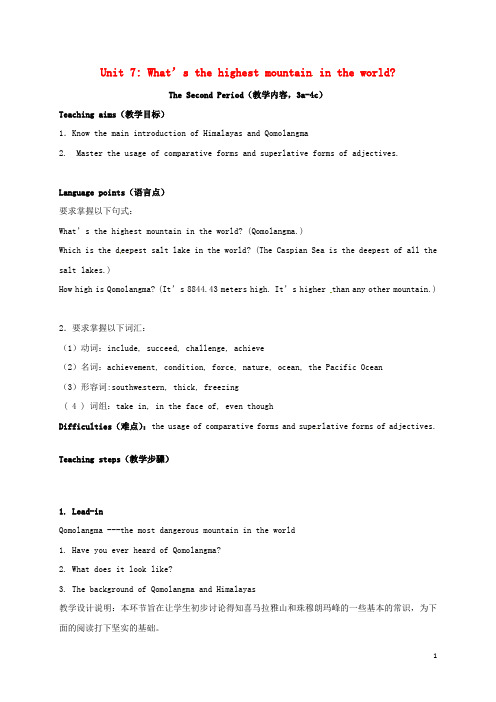
Unit 7: What’s the highest mountain in the world?The Second Period(教学内容,3a-4c)Teaching aims(教学目标)1.Know the main introduction of Himalayas and Qomolangma2. Master the usage of comparative forms and superlative forms of adjectives.Language points(语言点)要求掌握以下句式:What’s the highest mountain in the world? (Qomolangma.)Which is the d eepest salt lake in the world? (The Caspian Sea is the deepest of all the salt lakes.)How high is Qomolangma? (It’s 8844.43 meters high. It’s higher than any other mountain.)2.要求掌握以下词汇:(1)动词:include, succeed, challenge, achieve(2)名词:achievement, condition, force, nature, ocean, the Pacific Ocean(3)形容词:southwestern, thick, freezing( 4 ) 词组:take in, in the face of, even thoughDifficulties(难点):the usage of comparative forms and supe rlative forms of adjectives.Teaching steps(教学步骤)1. Lead-inQomolangma ---the most dangerous mountain in the world1. Have you ever heard of Qomolangma?2. What does it look like?3. The background of Qomolangma and Himalayas教学设计说明:本环节旨在让学生初步讨论得知喜马拉雅山和珠穆朗玛峰的一些基本的常识,为下面的阅读打下坚实的基础。
新版新目标英语八年级下册unit-7知识点总结
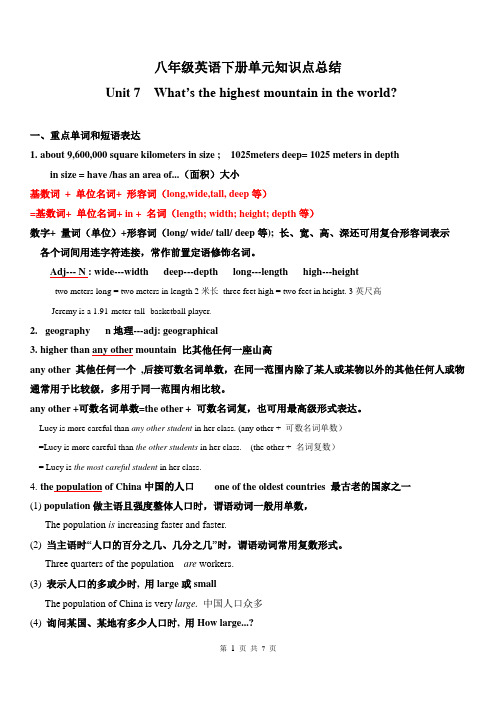
八年级英语下册单元知识点总结Unit 7 What’s the highest mountain in the world?一、重点单词和短语表达1.about 9,600,000 square kilometers in size ; 1025meters deep= 1025 meters in depthin size = have /has an area of...(面积)大小基数词+ 单位名词+ 形容词(long,wide,tall, deep等)=基数词+ 单位名词+ in + 名词(length; width; height; depth等)数字+ 量词(单位)+形容词(long/ wide/ tall/ deep等); 长、宽、高、深还可用复合形容词表示各个词间用连字符连接,常作前置定语修饰名词。
Adj--- N : wide---width deep---depth long---length high---heighttwo meters long = two meters in length 2米长three feet high = two feet in height. 3英尺高Jeremy is a 1.91-meter-tall- basketball player.2.geography n地理---adj: geographical3.higher than any other mountain 比其他任何一座山高any other 其他任何一个,后接可数名词单数,在同一范围内除了某人或某物以外的其他任何人或物通常用于比较级,多用于同一范围内相比较。
any other +可数名词单数=the other + 可数名词复,也可用最高级形式表达。
Lucy is more careful than any other student in her class. (any other + 可数名词单数)=Lucy is more careful than the other students in her class. (the other + 名词复数)= Lucy is the most careful student in her class.4.the population of China中国的人口one of the oldest countries 最古老的国家之一(1) population做主语且强度整体人口时,谓语动词一般用单数,The population is increasing faster and faster.(2) 当主语时“人口的百分之几、几分之几”时,谓语动词常用复数形式。
新目标八年级下英语Unit 7 W hat's the highest mountain in the world重点词组 句子和书面表达
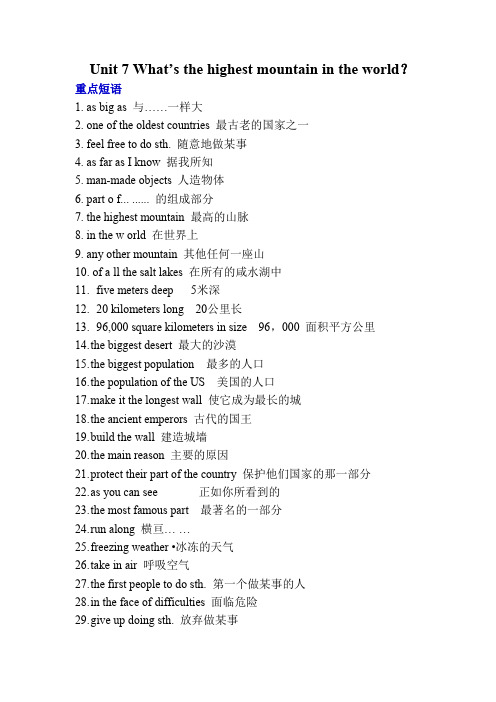
Unit 7 What’s the highest mountain in the world?重点短语1. as big as 与……一样大2. one of the oldest countries 最古老的国家之一3. feel free to do sth. 随意地做某事4. as far as I know 据我所知5. man-made objects 人造物体6. part o f... ...... 的组成部分7. the highest mountain 最高的山脉8. in the w orld 在世界上9. any other mountain 其他任何一座山10. of a ll the salt lakes 在所有的咸水湖中11.five meters deep 5米深12.20 kilometers long 20公里长13.96,000 square kilometers in size 96,000 面积平方公里14.t he biggest desert 最大的沙漠15.t he biggest population 最多的人口16.t he population of the US 美国的人口17.m ake it the longest wall 使它成为最长的城18.t he ancient emperors 古代的国王19.b uild the wall 建造城墙20.t he main reason 主要的原因21.p rotect their part of the country 保护他们国家的那一部分22.a s you can see 正如你所看到的23.t he most famous part 最著名的一部分24.r un along 横亘… …25.f reezing weather •冰冻的天气26.t ake in air 呼吸空气27.t he first people to do sth. 第一个做某事的人28.i n the face of difficulties 面临危险29.g ive up doing sth. 放弃做某事30.a chieve one’ s dream 实现某人的梦想31.t he forces of nature 自然界的力量32.r each the top 到达顶峰33.the most dangerous mountain 最危险的山峰34.o ne of the world’s most dangerous sports世界上最危险的运动之一35.m ountain climbing/climb mountains 登山(名词短语)/(动词短语)36.t he climbers from all over the world 来自世界各地的登山者37.r un along the southwestern part of China 横亘于中国的西南边界38.o f all the mountains 在所有的山峰中39.t hick clouds厚厚的云层40.m ore serious difficulties 更为严重的困难41.freezing weather conditions and heavy storms寒冷的天气状况和强劲的暴风雪41.the first people to reach the top of Qomolangma首次到达珠穆朗玛峰顶的人42.c hallenge oneself 挑战自己43.s ucceed in doing 成功做某事44.r ise the highest 海拔最高45.t he first woman to succeed 第一个成功的妇女46.r isk their lives 冒着他们的生命危险47.o ne of the main reasons 主要的原因之一48. the spirit of these climbers 这些攀登者的精神49. even though 虽然;尽管50. at birth 在出生的时候51. be awake 醒着52. run over with excitement 兴奋地跑过去53. walk into sb. 撞到某人54. fall over 摔倒55. take care of 照顾;照料56. every two years •每两年57. cut down the forests 砍伐林木58. endangered animals 濒危动物59. fewer and fewer pandas 大熊猫越来越少60. be in danger 处于危险之中61. the importance of saving these animals 拯救这些动物的重要性62. at the Chengdu Research Base在成都大熊猫研究基地63. panda keepers熊猫饲养员64. die from illnesses死于疾病65. bamboo forests竹林66. in the remaining forests在剩下的森林里67. another 200 or so还有大约200左右68. research centers研究中心69. wild animals野生动物70. only live for a short time because of illnesses由于疾病仅活很短的时间71. make more homes for the pandas为大熊猫建造更多的家园72. catch whales for meat, fat and oil为肉,脂肪和油而捕鲸73. sea life海洋生物74. jump high out of the water高高地跃出水面75. rules on whale protection保护鲸的制度76. water pollution水污染77. stop putting rubbish into the sea停止往大海里丢垃圾78. whale parts sold被卖的鲸鱼器官79. have to be protected不得不被保护80. protect … from…保护…免于…的伤害81. weigh many times more than this panda 比这只熊猫重很多倍82. weigh about 0.1 to 0.2 kilos 重量大约是0.1到0.2千克重点句型1. It is -\~adj. + (fo r sb. ) to do sth.It is also very hard to take in a ir as you get near the top.当你接近山顶时,连呼吸都会困难。
新目标八年级英语下册Unit 7教学设计

新目标八年级英语下册Unit 7教学设计nit7 Would you mind turning down the music?Section A?a銆?b銆?c紝鍧囧洿缁?a幇Would you mind +銆傚啀鍛堢幇Would you mind not+?a鐨勫?a銆?b鎴愩€?a2b?a ould you mind 鈥?鍜學ould you mind not鈥?2b?c瑕佹眰浠?a銆?b熻兘椤圭洰銆傚湪3a3b ould you, Could you, have to?閮ㄥ垎鐨刧roupwork?Section B?a銆?a銆?b 閮藉洿缁曠殑鍗¢€氱敾灞曞紑锛?c鏄?a銆?b紝3a鍜?b3a銆?b鐨勪换鍔★紝鍔犳繁瀛︾敓瀵光€В鍜岃繍鐢ㄣ€係elf check屼絾绗?2ф,鍗抽€氳繃瀵绘壘涓鏂囧寲鑳屾櫙涓嬬殑绀间华锛?紝浠ュ強濡備綍鍋氬嚭鍚堥€鐨勫彞鍨嬧€濓紝鎴戝皢SectionB1a-2c鍜孲ectionA3a-4鏁村悎鍦ㄤ竴璧蜂綔涓ectionB1a-2cН鏋佹€э紝ectionA3a-4鈥濈殑鐞嗚Вч?т笂鍐孶nit 11an you鈥?/could you 鍙奀ould you please鎻愬嚭璇锋眰,х殑锛屽唴瀹硅创杩戠敓娲伙紝瀛︾敓姣旇緝瀹规槗杩涘叆瑙掕壊銆?鐨勮嚜涓汇€佸悎浣溿€佹帰绌躲€佸疄璺电殑鑳藉姏銆傚洜姝ゅ湪鑰冭檻鏈鈥滃揩涔濯掍綋璇句欢灞曠ず锛屽苟閰嶄互涓板瘜鐨勫浘鐗囧強鑹插僵锛屼负瀛︾敓鐨箰鎴愰暱銆?鈶?Be able to pronounce and master the new words and phrases.Words: mind, yard, dish, polite, perhaps, door, line, return, voice, term, Asian, Europe, impolite, allow, public, cough, break, smoke, drop, litter, cigarette, criticize, behave锛宔tc.Phrases: turn down, not at all, right away, wait in line, cut in line, keep down, at first, put out, pick up.鈶?Master the target language:Would you mind moving your bike? Sorry, I will do it right away.Would you mind not playing baseball here? Sorry, we鈥檒l go and play in the park.Could you please wash the dishes? Ok, I will do them in a minute.鈶?Learn to make requests and apologies, using the target language.鈶?Learn the modal verb that can express request.1.Would you mind 鈥?鍜孋ould you please 鈥? 浠ュ強Sorry, I鈥檒l 鈥?绛夊彞鍨嬬殑鐞嗚В?2.Would you mind 鈥?鍜孋ould you please 鈥?鏃讹ould you mind +鍔ㄥ悕璇嶏紝鑰孋ould you please +鍔ㄨ瘝鍘熷舰銆ot锛宯ot鎵€鏀剧殑浣嶇疆锛屽Would you mind not鈥? Could you please not 鈥?锛岃繖浜涘唴瀹圭殑鎺屾彙鍜岃繍鐢ㄦ槸瀛︾敓瀛︿範鐨勯毦鐐广€?"??棣栧?硅瘽绛夌幆鑺備腑銆??璇炬椂瀹夋帓鏁欐硶閫夋嫨SectionA1a-Grammar Focus(備綍鍋氬嚭鍚堥€傜殑鍥炵瓟銆?SectionB1a-2c, SectionA3a-4(?SectionB3a- Selfcheck(濈殑鐞嗚В鍜岃繍鐢? ReadingReview of Unit7(ч)璇炬椂Period1у??,閫氳繃鍚戜粬浜烘彁绀艰矊璇锋眰浠ュ強鍋氬嚭鍥炵瓟,鏉ョ粌涔爓ould you mind (not)doing 杩欎竴璇,ц儐姝g‘鐨勫彛澶翠氦闄呭拰姝g‘鐞嗚В?istening method, speaking method, cooperating method, inductive method殑瀛︿範銆?浠诲姟鏁欏笀娲诲姩瀛︾敓娲诲姩?Step 1 warming upLet鈥檚say the chart 鈥淣o, not at all鈥? Teacher says and have Ss do. Say and do the chart :鈥淣o, not at all鈥?鈥淪tand up, stand up, would you mind standing up?Sit down, sit down, would you mind sitting down?Clap your hands,clap your hands,Would you mind clapping your hands?Touch your nose, touch your nose,Would you mind touching your nose?鈥?鈥淣o, not at all鈥?Step 2 lead in1. Say, I think it is a little bit hot in our classroom and I want to ask someone to open the window. What can I say?Have Ss give some answers.2. Write them on the board: Could you please鈥? 鈥? Would you mind opening the window? Explain that the last example is a very polite way of making a request.Answer the teacher鈥檚questions.Understand the new sentences: 鈥淐ould you please鈥? 鈥? Would you mind opening the window?鈥?Step 3 Presentation1. Have Ss look at the picture and ask a pair of students to read the dialogue in the picture.2. Then show some other pictures. Have Ss look and say them using 鈥渨ould you mind 鈥?鈥漧ike above.3. Look at the picture and ask a pair of students to read the dialogue in the picture.4. Then show some other pictures. Have Ss look and say them using 鈥渨ould you mind not 鈥?鈥?like above.1. Look at the picture and read the dialogue in the picture.2. Look at some other pictures and say them using 鈥渨ould you mind 鈥?鈥漧ike above.3. Look at the picture and read the dialogue in the picture.A: Would you mind not smoking?4. Look at some other pictures and say them using 鈥渨ould you mind not 鈥?鈥?like above.Step 41a1. Point to the four requests in the box. Read each phrase to the class and get students to repeat it. Ask students to explain what each one means. They can use actions and simple explanations.2. Then get students to write the letter of each request in the correct place in the picture to match the requests with the people. Point out the blank boxes in the picture. Ask students to finish the task on their own.3. Correct the answers.2. Write the letter of each request in the correct place in the picture to match the requests with the people.3. Correct the answers.Step 5 Listening 1b1. Ask different students to look at the list of requests in Activity 1a and read each one to the class.2. Then say, Please listen to the recording and number the requests(1~4) above in the order you hear on the recording. Play the recording and have Ss write the numbers 1 through 4 on the lines after the requests.3. Correct the answers.4. Listen again and fill in the blanks.2. Listen to the recording and number the requests(1~4) above in the order you hear on the recording. Then write the numbers 1 through 4 on the lines after the requests.3. Correct the answers.4. Listen again and fill in the blanks.Listening2a and 2b1.2a. Listen and number the pictures in the order you hear them.2. 2b.Listen again. Match the requests in activity 2a with the responses below.3. Correct the answers.1. Listen and number the pictures in the order you hear them in 2a.3. Correct the answers.Step 7Pairwork1. Have Ss Look at the pictures of 1a and 2a; let a pair of students to read the words in the sample dialogue.2. Then say, Make conversations like this about the information above.Give students a few minutes to work in pairs. When they work, walk around the room checking the progress.3. At the end ask several pairs of students to say their conversations to the class. 1. Look at the pictures of 1a and 2a; and read the words in the sample dialogue: A: Would you mind moving your bike?B: Sorry. I鈥檒l do it right away.A: Would you mind not wearing those old jeans? They look terrible.B: Ok. I鈥檒l put on another pair.2. Make conversations like this about the information above.3. Say the conversations to the class.Step8Grammar Focus(3minutes)Review the grammar box first. Divide the class into two groups. One group read the statements and the other read the responses.Step 9Practice(5minutes)Do some exercises.Do the exercises.Step 10 HomeworkGroup A:1. Would you mind being a polite student? Please look at the picture and Write down the conversations.2.Find out other polite ways to make requests锛堢ぜ璨岀殑璇锋眰鏂瑰紡锛塱n English.Group B:1. Read and try to understand the Grammar Focus.Try their best to finish the homework well.Unit7 Would you mind turning down the music?Section A1a~Grammar Focusnot at all锛宼urn down 锛宺ight away锛寉ard---Would you mind turning down the music? ---No, not at all.Unit7 SectionB1a~2c, SectionA3a~4璇炬椂Period2у??2. Teaching Difficulty Make conversation freely.?銆?浜斻€佽祫婧愬噯澶?1. A computer for multimedia use. 2. A tape recorder.鏁欏笀娲诲姩瀛︾敓娲诲姩?Step 1Greet the class and review.(5minutes)1. Greet the class as usual and check the homework.2. First ask Ss to see a piece of movie.Then show some pictures and ask a pair of students to make a conversation according to the pictures using 鈥渨ould you mind (not) 鈥?鈥?Then look at the pictures and make a conversation according to the pictures using 鈥渨ould you mind (not) 鈥?鈥?Step 2New words(3minutes)Learn the new words.瀛︿範鏂板崟璇嶃€?Step 3Speaking (SectionB1a&1b)(5minutes)3. Pairwork. Show some other pictures. Have Ss look at the pictures and talk about them using鈥淲ould you ever complain about them?鈥?1. Look at the pictures on the screen and say something about them.2. Read each situation and think about the two questions. Then share the answers with the class.3. Look at the pictures and talk about them using鈥淲ould you ever complain about them?鈥?Step 4Listening (SectionB2a&2b)(8minutes)1. Listen and number the correct sentences (1~3) in Activity 1a.2. Listen and fill in the blanks.(1)Conversation 1What made the girl unhappy?She got the_______ _______shirt.What鈥檚her solution?She will get a _______ shirt.(2)Conversation 2Where did this happen?It happened in a __________.What will he get?He will get some ______ ______ right away.(3)Conversation 3What was the boy鈥檚problem?He got a pen that_____ ______.3.2b. Listen to the three conversations again to fill in the blanks .C heck the answers.Pairwork(SectionB2c)(5minutes)1. 2c. First ask two students to read the example in the sample dialogue.2. Then let students look at the problems in Activity 2b and work with their partners.3. Role play the conversations from Activity 2b like this.4. At the end ask several pairs of students to say their conversations to the class. 1. Read the example in the sample dialogue.A: This shirt is too big. Would you mind giving me a smaller one?B: Not at all. Here you are.2. Look at the problems in Activity 2b and work with their partners.3. Role play the conversations from Activity 2b like this.4. Say their conversations to the class.Writing (SectionA3a)(10minutes)1. Show some pictures on the screen and ask students to explain what is happening in each picture.Look at these pictures and role play the conversations like this.A: Would you mind (not) doing 鈥?B: 鈥?2. SectionA3a. Go through the instructions with the class. Look at the pictures and the note. Ask students to read the note.Then let students fill in answers on their own.Check the answers.1. Look at the pictures and explain what is happening in each picture.2. Role play the conversations like this.A: Would you mind (not) doing 鈥?B: 鈥?3. Look at the pictures and read the note.Then fill in answers on their own.Check the answers.Step 7Pairwork and Groupwork(7minutes)sample dialogue. Let two students read it to the class.(sleeping in the bedroom, could you, turn down the TV, would you mind)1. Read the sample dialogue.(sleeping in the bedroom, could you, turn down the TV, would you mind) A: __________ babysitting your little cousin?B: OK, I鈥檒l do it at once. Do I have to __________?A: Yes, she is __________.B: OK, when I finish, _________ let me watch TV?A: Of course.Step 8Summary and homework(2minutes)Group A:1. Make your own conversations.Group B:1. Read the listening conversations on P91 and P92.2. Make your own conversations.Unit 7 Would you mind turning down the music? barber terrible haircutA: This shirt is too big. Would you mind giving me a smaller one?璇炬椂Period3у??1. Review some words and phrases learnt in this unit and learn new words and phrases: Line锛?wait in line锛宎nnoy锛宎nnoyed锛宲olite锛宲erhaps锛宒oor锛宑ut in line锛宧asn鈥檛=has not2. Do reading and writing practice.2愰珮瀛︿範鏁堢巼銆?浜斻€佽祫婧愬噯澶?1. A computer for multimedia use. 2. A tape recorder.浠诲姟鏁欏笀娲诲姩瀛︾敓娲诲姩?Step 1 Greeting and Revision.(4minutes)1. Greeting Ss.2. Check the homework.3. Ask Ss to do the exercise.1. Greeting the teacher.2. Do the exercise. 鐢?would you mind 鈥︽敼鍐欎笅闈㈠彞瀛愩€?1. Don鈥檛talk.2. Please sit down.3. Don鈥檛use that pen.4. Please turn off the light.5. Don鈥檛speak loudly in the library.6. Please clean the classroom.閫氳繃澶嶄範杩涗竴姝ュ珐鍥篧ould you mind 鈥︾殑鐢ㄦ硶銆傦級Step 2: Section B 3a(11minutes)1.Ask ss to have the Free talk:2. Show new words and phrases.3锛嶳ead the article to the class. Ask ss which words they don鈥檛understand .Write these words on the board.4. Let students read the article when they understand all the sentences .ask them to underline the things that are annoying .Then have them circle what people do when something annoying happens.5. Let students listen and answer one main questions .Then check the answers.6. Ask students to read it again and write T or F.7. Ask ss to read and answer 4 questions.8. Key points.(1) Do you often get annoyed (get angry)?(2) When do you get annoyed?(3)Do you often complain about them?(4.) What will you do when it happens?2. Read new words and phrases.3. Read and finish the exercise.4. Read and underline the things that are annoying .then circle what people do when something annoying happens.5. Listen and answer one main questions.6. Read it and write T or F.7. Read and answer 4 questions.8. Take notes.?Вф紝瀹屾垚浠诲姟銆?Step 33b(5minutes)1. Ask ss to look at the pictures. And ask difficult students to tell what is happening in each picture.2. Go through the instructions with the class point to the blank lines where ss win fill in their answers.3. Ask students to complete the activity on their own.4. C heck the answer.Step 4 Group work.(8minutes)1. Ask two students to read the dialogue.2. Ask another pair of students to give another complaint and action.3. Ask students to complete the work in groups. When they work .Walk around the room checking their progress and offering help if necessary.4. Ask a few students to share the sample conversation.5. List the most common complain and the best action advice.4. Share the sample conversation.Step 5 Self check 2(7minutes)1. Go through the instructions with the student look at the picture .Ask students totalk about the picture.2锛嶢sk ss to write a letter on their own.3. Ask a few students to share their letters.4. Check the answers. Answer will vary.Step 6: Exercise.(5minutes)Step 7: Summary(3minutes)This class we鈥檝e had a lot of reading, writing and speaking practice using thetarget language.Step 8: Homework.(2minutes)Group A:1. Make conversations.2. Retell the story.Group B:Make conversations.Unit 7 Would you mind turning down the music? Words and phrases:Key structure:I get annoyed when 鈥?When this happens .I would / may say 鈥?Would you mind 鈥?Would you mind not 鈥?Unit7 Reading: would you mind keeping your voice down? 璇炬椂Period4у??2. Reading: Would you mind keeping your voice down??缁忚繃鍓嶉潰鍑犺妭璇剧殑瀛︿範锛屽В鍐抽棶棰樻潵鑾峰緱鐭ヨ瘑锛屽己璋冭嚜瀛︿笌鍚堜綔瀛︿範,В鏂囩珷锛屼互姝ゆ潵鍩瑰吇瀛︾敓鐨勯槄璇荤?浜斻€佽祫婧愬噯澶?1. A computer for multimedia use. 2. A tape recorder.鏁欏笀娲诲姩瀛︾敓娲诲姩?Step 1warm up(2minutes)Greet the class as usual and show the learning goals.Step 2Section 1 Before You Read(3minutes)Pairwork. First ask students: Do you know the word 鈥渂ehavior鈥? Let students look at the picture below. Ask how many bad behaviors can you see?Then have students make a list with their partners.Look at the picture below and find out how many bad behaviors.Then make a list with their partners.?Step 3Section 2 While You Read(16minutes)1. Play the tape for students to listen and answer the questions:2.(1) Ask ss to read reading strategy:(2) Let ss read and underline the topic sentence of each paragraph.(3)Then do 3a. Match the paragraphs with the best summaries.3. Ask ss to read the passage carefully and answer more questions about the passage.4. Read again; Explain some useful phrases and some sentences what ss can鈥檛understand.5. Have a word Competition.1. Listen and answer the questions: (1).What does 鈥渆tiquette鈥?mean?(2). Is etiquette the same in every culture or in every situation锛?2.(1)Read: Topic sentence is a summary sentence of each paragraph. It may be at the beginning of the paragraph or at the end of the paragraph, it also may be in the middle of the paragraph.(3) Match the paragraphs with the best summaries.3. Read and answer more questions about the passage. (1).If someone cuts in front of you in a line, what should you say?(2). If someone is smoking on a bus, what should you say?(3. If you see someone you know dropping litter, what should you say?Then complete the forms According to the text.1.浜嗚В2.勯槄璇婚€熷害銆傘€?3ц嚧浜嗚В锛?5.?Step 4Section3 After you read(10minutes)1. 3b Ask students to think of polite suggestions they could make to each person who is breaking a rule of etiquette according to the picture.2. Groupwork. Who is the polite star?Have Ss discuss and give a Report: we think 鈥?is the polite star. Because he/she鈥n class,鈥?at home and n public.3. 3c Scan the reading quickly again and find examples of behavior from it. Ask students Are these things always wrong, or does it depend on situation or culture?Then let students put them in the correct column.Check the answers.1. Students think of polite suggestions they could make to each person who is breaking a rule of etiquette according to the picture.Example:A: A girl is dropping litter.B: You may say would you mind picking it up?Role play with a partner.Ask some students to say their suggestions.2. Discuss: Who is the polite star? and give a Report3. Find examples of behavior from reading. Then answer: Are these things always wrong, or does it depend on situation or culture?at last put them in the correct column.缁冦€傚洖褰掍富棰橈紝鍚屾椂涓哄啓浣滃仛閾哄灚銆?Step 5Section 4 Go for it!(10minutes)1. First ask students: Have you seen someone breaking a rule of etiquette?Then ask them to write a letter of complaint to the local newspaper according to what they have seen.2. Ask students to check their writing with their partners.Answer the question: Have you seen someone breaking a rule of etiquette? Then write a letter of complaint to the local newspaper according to what they have seen.2. Check their writing with their partners.涔﹂潰钀藉疄锛岃繘涓€姝ヤ簡瑙d笉鍚屽浗瀹跺強鏂囧寲鑳屾櫙涓嬬殑绀间?Step 6Summary(2minutes)Ask: What have we learned?We鈥檝e also learned something about the word 鈥渆tiquette鈥? Step7Homework(2minutes)Group A:1. Try to find out some rules of etiquette that are different in foreign countries.2. Finish the workbook.Group B:Finish the workbook.Finish their homework.Reading: Would you mind keeping your voice down? etiquette鈥昻ormal and polite social behaviorWould you mind (not) doing this?Excuse me. Could you please...锛?Unit7 Reading: would you mind keeping your voice down? 璇炬椂Period5у??Unit 7ould you mind +doing... ?鍏崇粌涔犮€??╁浐鎵€瀛︾煡璇嗐€? 浜斻€佽祫婧愬噯澶?1. A computer for multimedia use. 2. A tape recorder. Review of Unit7。
新目标英语八年级下 语法 Unit 7

Unit 7 Would you mind turning down the music? 常考短语:Not at all Turn down Right away Wait in line Cut in lineAt firstKeep…downT ake carePut outBreak the rulePick up1.Would you mind turning down the music? 你介意把音乐声关小一点吗?-No, not at all. 不,一点儿也不。
Would you mind doing…? 是用来客气地提出请求、要求的方式之一●也可以说成Would you mind one’s doing…?意为“请你做某事好吗?”“做某事你介意吗?”或“你介意做某事吗?”●其否定形式为“Would you mind not doing…?”——在回答时用yes表示“介意”,用no表示“不介意”。
-Would you mind closing the window? 你介意关上窗户吗?-No, not at all / certainly not / of course not. 不,一点儿也不/当然不介意。
-Would you mind my sitting here? 你介意我坐在这儿吗?-Yes, I do. 是的,我介意Mind的用法●Mind用作动词,意为“介意,在乎,反对”。
后通常跟名词、动名词或代词作宾语。
e.g. Do you mind my smoking? 你介意我抽烟吗?I don’t mind what he said and did. 我对他的所作所为并不介意。
●Mind用作名词,意为“想法,意见,主意”e.g. Jack changed his mind at last. 最后杰克改变了主意。
2.Turn down (将音量)调低,关小。
其反义词为turn up,意为“调大,开大”。
2015人教版新目标八年级英语下unit-7Section-B-2a-2e-reading

Para 2
Para 3 Para 4
The ways of saving pandas.
Lin Wei and her job.
The panda keepers take care of pandas.
Paragraph 1
It is 8:30 a.m. at the Chengdu Research Base. panda keepers are preparing the milk for the baby pandas’ breakfast. At 9:00 a.m., they find that most of the babies are already awake and hungry. When the babies see the keepers, they run over to them with excitement and some of them even walk into their friends and fall over!
Unit 7
Reading
(Section B 2a-2c)
熊猫是如此受欢迎以至于它们是中国的象征之 一。事实上,世界上所有的人们都喜爱这些聪 明又可爱的动物。熊猫喜欢吃竹子并且他们主 要居住在森林里。然而,熊猫变得越来越少。 其中的一个主要原因是人们砍倒了森林。熊猫 找不到足够的食物吃。另一个原因是熊猫宝宝 经常死于疾病。所以我们必须做一些事情来保 护濒临灭绝的动物们。我们可以建立一个教育 机构来告诉人们保护熊猫的重要性。另外,科 学家们正在为了更好的了解熊猫的习性做研究。 中国政府也尽力去帮助救助熊猫。我们都希望 未来将会有更多的熊猫。
- 1、下载文档前请自行甄别文档内容的完整性,平台不提供额外的编辑、内容补充、找答案等附加服务。
- 2、"仅部分预览"的文档,不可在线预览部分如存在完整性等问题,可反馈申请退款(可完整预览的文档不适用该条件!)。
- 3、如文档侵犯您的权益,请联系客服反馈,我们会尽快为您处理(人工客服工作时间:9:00-18:30)。
情 景 交 际 选 择
normal adj. 正常的; 正规的
behaviquette is not the same in every culture, or in every situation. For example, standing very close to the person you are talking with is quite common in some Asian countries. However, if you do this in Europe, some people might feel uncomfortable. Even in China, we all know that etiquette is not the same in all situations. Perhaps we think that talking loudly in our own homes is fine, but there are other places where talking loudly is not allowed.
in public.
impolite adj. 无礼的; 粗鲁的 cough v. 咳嗽 public n. 公众
sneeze v. 打喷嚏
If we see someone breaking the rules of etiquette, we may give them some suggestions politely. Perhaps one of the most polite ways is to ask someone, Would you mind doing this or Would you mind not doing that. For example, if someone cuts in front of you in line, you could ask them, Sorry, would you mind joining the line? break the rule 不服从; 不遵守 politely adv. 客气地; 斯文地
3. It is better to keep your voice down in public places. T 4. “Would you mind…” is a polite way to give people suggestions . T 5. We have to be careful to make requests. T 6. Rules of etiquette are always different. F
Asian adj. 亚洲的; 亚洲人的 Europe 欧洲
allow v. 允许; 承认
uncomfortable adj. 不舒服的
For example, most people would agree that talking
loudly in a library, a museum, or a movie theater is impolite. Even if you are with your friends, it is better to keep your voice down in public places. In fact, we should also take care not to cough or sneeze loudly
Although rules of etiquette can often be different,
some rules are the same almost everywhere in the world! For example, dropping litter is almost never allowed. If you see someone you know doing this, you can ask them, would you mind picking it up?
China English-speaking countries
根据汉语意思填空。
1. I will have a meeting ___________ (马上). right away 2. If you _________ (插队), others will not cut in line be pleased. 3. Doing morning exercises is __________ good for (对……有好处) our health. 4. When we got to the cinema, the tickets had been __________ (卖完). sold out 5. After the camp all the students felt excited ________ (激动的).
A. Would you mind my smoking here? B. Would you mind waiting in line? C. Would you mind standing straight? D. Would you mind not talking so long on the telephone? E. Would you mind not talking so loudly?
If someone is smoking on the bus, we could ask,
Excuse me, could you please put out that cigarette? People don’t usually like to be criticized, so we have to be careful how we do this. smoke v. 抽烟; 吸烟 cigarette n. 香烟; 卷烟; 纸烟 criticize v. 批判 put out 熄灭
Would you mind keeping your voice down?
If you spend some time in an English-speaking country, you might hear the term ‘etiquette’. It means normal and polite social behavior. This may seem like a difficult word at first, but it can be very at first 首先 useful to understand.
6. If you see someone you know doing this, you can ask them, 7. Even if you are with your friends, it is better to keep your voice down in public places.
spend+时间+在某地 We’ll spend three days in this hotel. spend+时间或钱+on sth. She spent all her money on clothes. spend+时间或钱+(in) doing sth. She spends two hours (in) playing the piano every day.
Would you mind keeping your voice down when you are making a telephone call?
3c. Deeply understand
Find wrong habits in different situations or cultures from the reading. Think of more examples. Put them in the column.
3b. Look again at the picture. Think of polite suggestions.
Would you mind not dropping litter?
Would you mind picking up the litter? Could you please not spit anywhere? Could you please put out your cigarette?
8. In fact, we should also take care not to cough or sneeze loudly in public if possible.
9. People don’t usually like to be criticized, so we have to be careful how we do this. 10. For example, dropping litter is almost never allowed.
In some situations or cultures standing close to others you are talking with Always wrong
dropping litter everywhere
Make comparison about etiquette between China and other English-speaking countries.
Important and useful sentence
1. If you spend some time in an English-speaking country, you might hear the term ‘etiquette’. 2 . If you do this in Europe, some people might feel uncomfortable. 3. If we see someone breaking the rules of etiquette, we may give them some suggestions politely. 4. If we see someone breaking the rules of etiquette, we may give them some suggestions politely. 5. If someone is smoking on the bus, we could ask,
